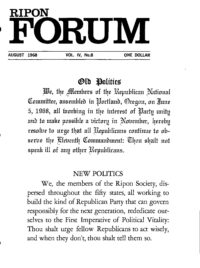 CHARLES E. GOODELL
CHARLES E. GOODELL
The lethargy which dominates political institutions today demands of the Republican Party a new era of principled pragmatism. It is time that we come alive and bring Republican principles to the solution of contemporary problems. The feasibility of this can perhaps be best illustrated by recounting an incident that occurred during a Senate-House Conference on poverty legislation.
House Republicans were united with Senate Democrats and Republicans in opposing the so-called Green Amendment to place Community Action agencies under the direct control of municipal governments. We were also striving to introduce new incentives for the involvement of private enterprise in solving poverty problems. Senator Robert Kennedy was one of the Senate conferees. At one point in the discussion he became particularly impassioned in telling a big-city Democratic House conferee that old approaches weren’t good enough. What worked in the 1930s won’t necessarily work in the 1960s. You must involve private enterprise. The welfare system is demeaning and destroys the dignity of people while wasting money. You can’t do everything from Washington, he said. You have to involve the poor themselves in self-help projects, give incentives for development of private ghetto industry and housing. You must take a new approach and recognize the failures of the past. It was at this point that House conferees passed Senator Kennedy a note offering him the Republican nomination for President on such a platform. Recovering quickly from his evident surprise, he smilingly replied: “The way things are going, I just might take it.”
The lethargy which dominates political institutions today demands of the Republican Party a new era of principled pragmatism.
Thus, the Senator’s pragmatism caused him to veer his course sharply over the past year. He espoused a whole series of programs of essentially Republican origin. These included federal revenue sharing with states and localities, tax credits to employers for training and hiring the unskilled, block grants for education and other purposes to strengthen local and state government, wage subsidies and tax incentives to train the poor, private incentives in housing and industrial development to reverse the process of decay in ghetto areas, a restructuring of the wasteful welfare system and human renewal priorities in the expenditure of federal funds to control inflation and high interest rates while investing more federal dollars in areas of urgent human need.
This spring Senator Kennedy began talking about “participatory democracy”, a recharacterization of the concept of involvement of all sectors and individuals working together in society to solve problems. It has strong Republican overtones. Obviously, my point is not that Senator Kennedy was becoming a Republican. Senator Kennedy felt the need for new approaches to old problems. His pragmatism attracted him to many viable Republican proposals that had been consistently rejected by the Democratic Administration. These proposals defy labeling as conservative or liberal; they are realistic approaches to the kind of innovation so desperately demanded in today’s society.
It is time Republicans stopped rigidly classifying and automatically reacting against well-labeled but poorly conceived and implemented Democratic attempts to solve pressing national problems. We can do better than the problem-potions that have so often been offered by Democrats in the sixties. The poor and the downtrodden and the non-whites need more than the passive presentation of equal opportunity when society and circumstance have rendered unequal their abilities to respond. They require hyper-equality, if you will.
We can do better than the problem-potions that have so often been offered by Democrats.
This is completely consistent with other government programs for the farmer, the businessman, the elder citizen and other groupings in society narrowly benefited by specific programs on the theory that society itself benefits by their increased security and productivity.
 We must reject the notion that government involvement, per se, is bad in striving to solve social problems. Our government programs should be better because they recognize the limitations of government.
We must reject the notion that government involvement, per se, is bad in striving to solve social problems. Our government programs should be better because they recognize the limitations of government.
Abroad, we must implement the lesson of Vietnam that many international problems are not susceptible to solution by intrusion of American military might.
We must recognize that urban upheaval and social discontent will not be eliminated by the mere intrusion of police power. Ours must be the pragmatic approach, implementing the new enlightenment in the social sciences, based upon the sound concept of diversified rather than centralized authority in ordering social organization, be it at home or abroad.
Our nation needs new leadership that understands the imperatives of our age. We stand potentially at the threshold of a New Era … a New Era of realism and enlightenment. Republican principles – and yes, Republican clichés – are peculiarly suited to serve our nation in the New Era, if we understand them and are willing to apply them anew.
Congressman Goodell of New York is a member of the Platform Committee at the Republican National Committee and Chairman of the Subcommittee on Equal Opportunity Society in an Urban Society.




